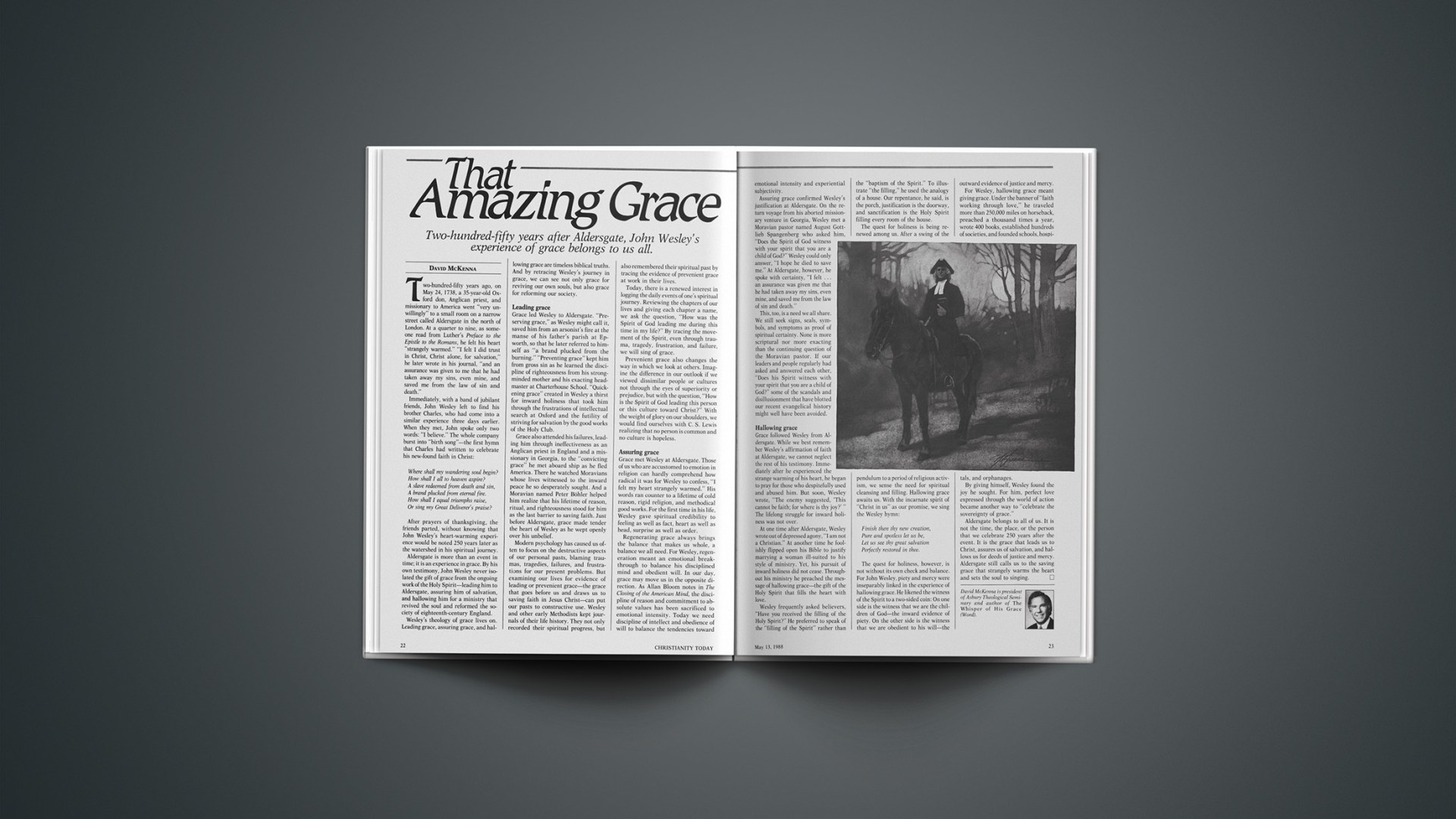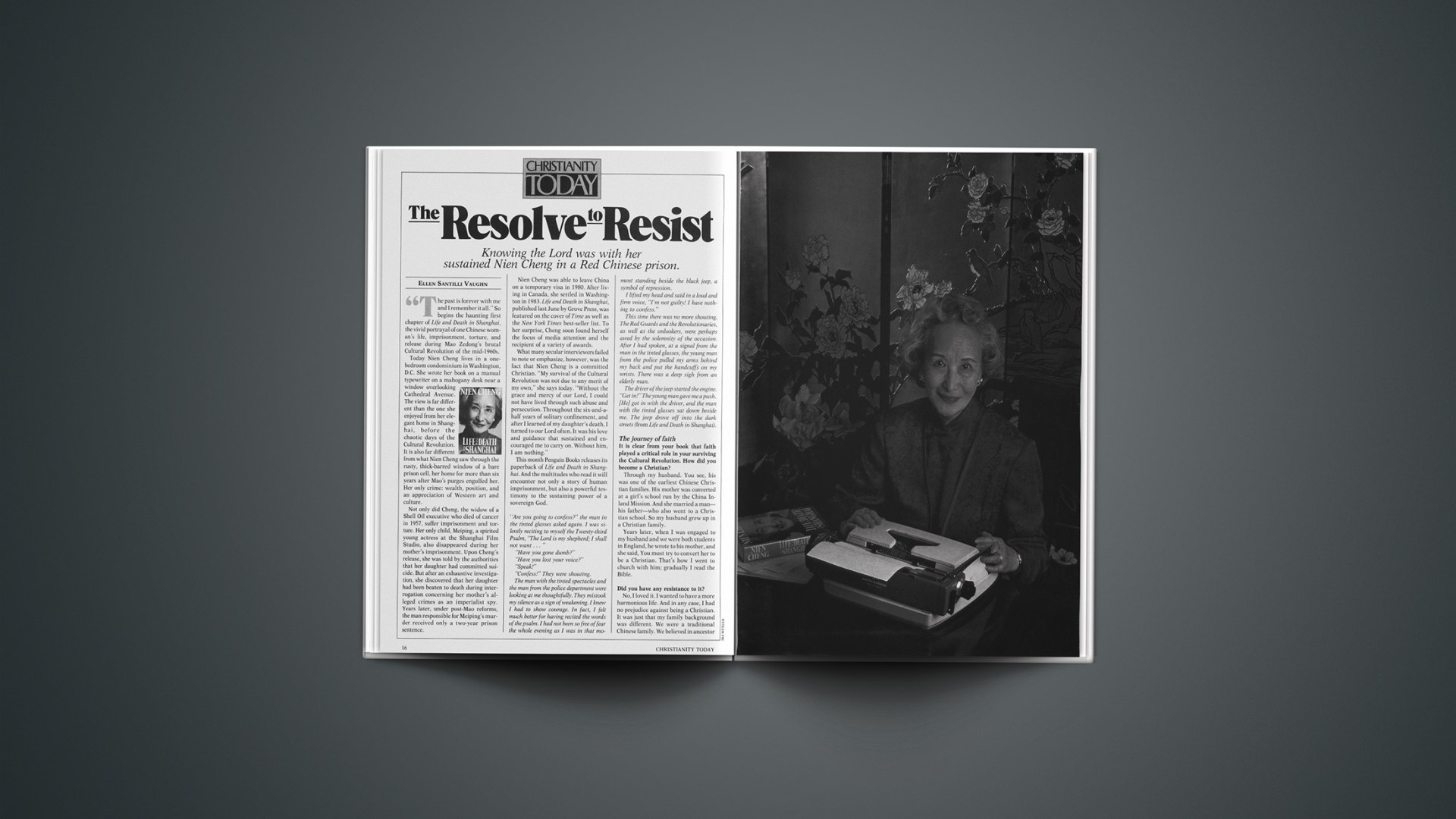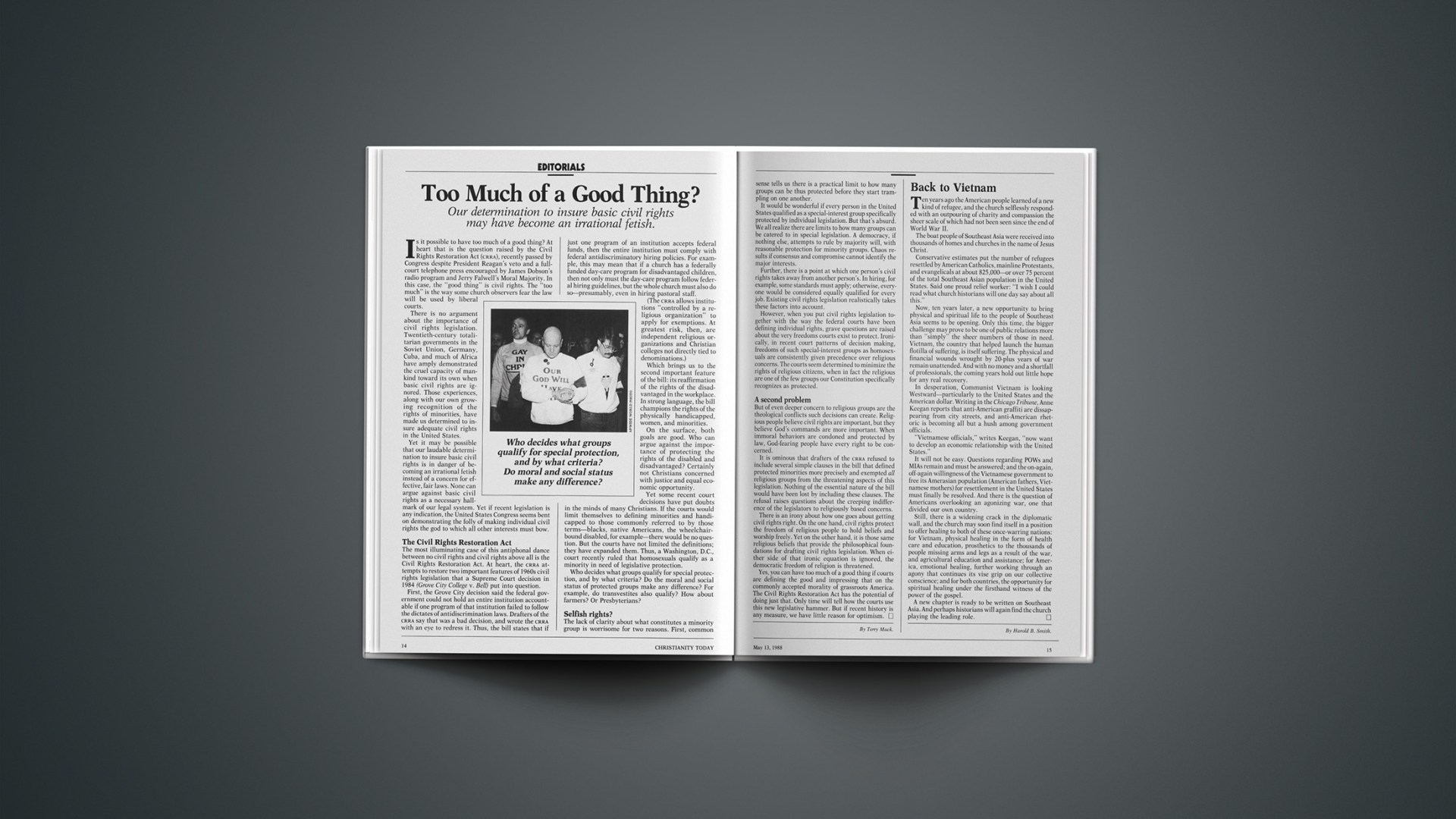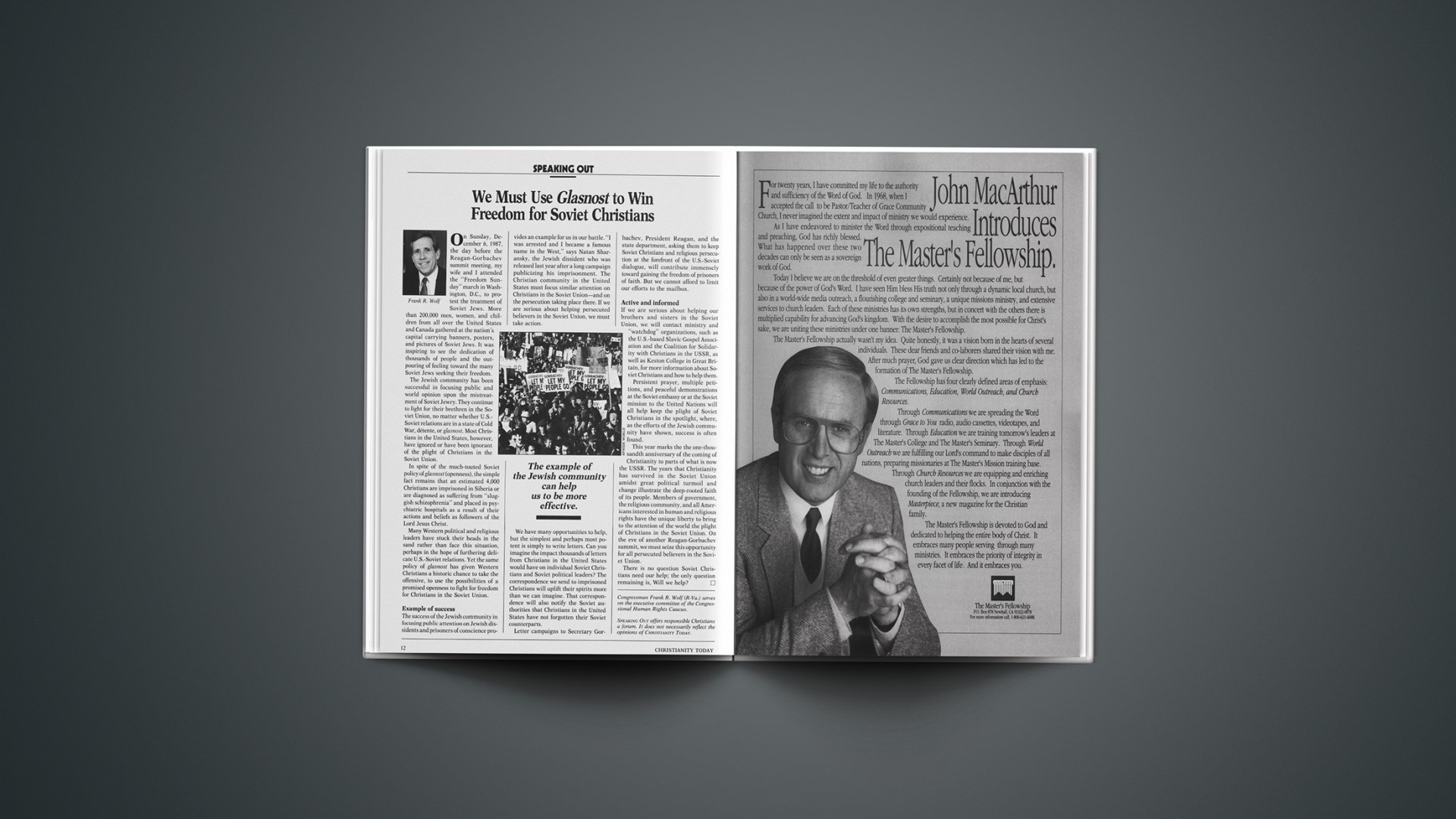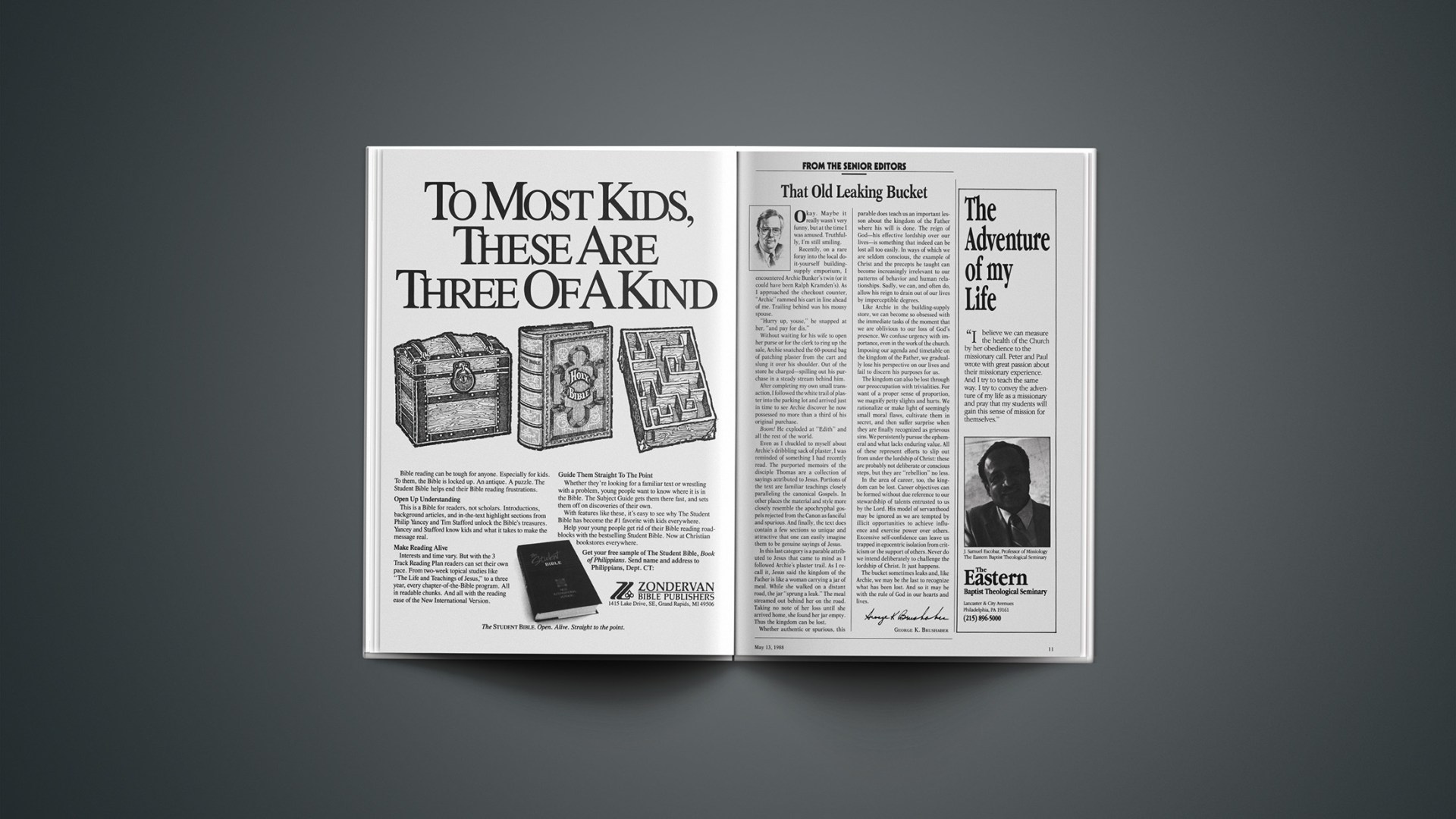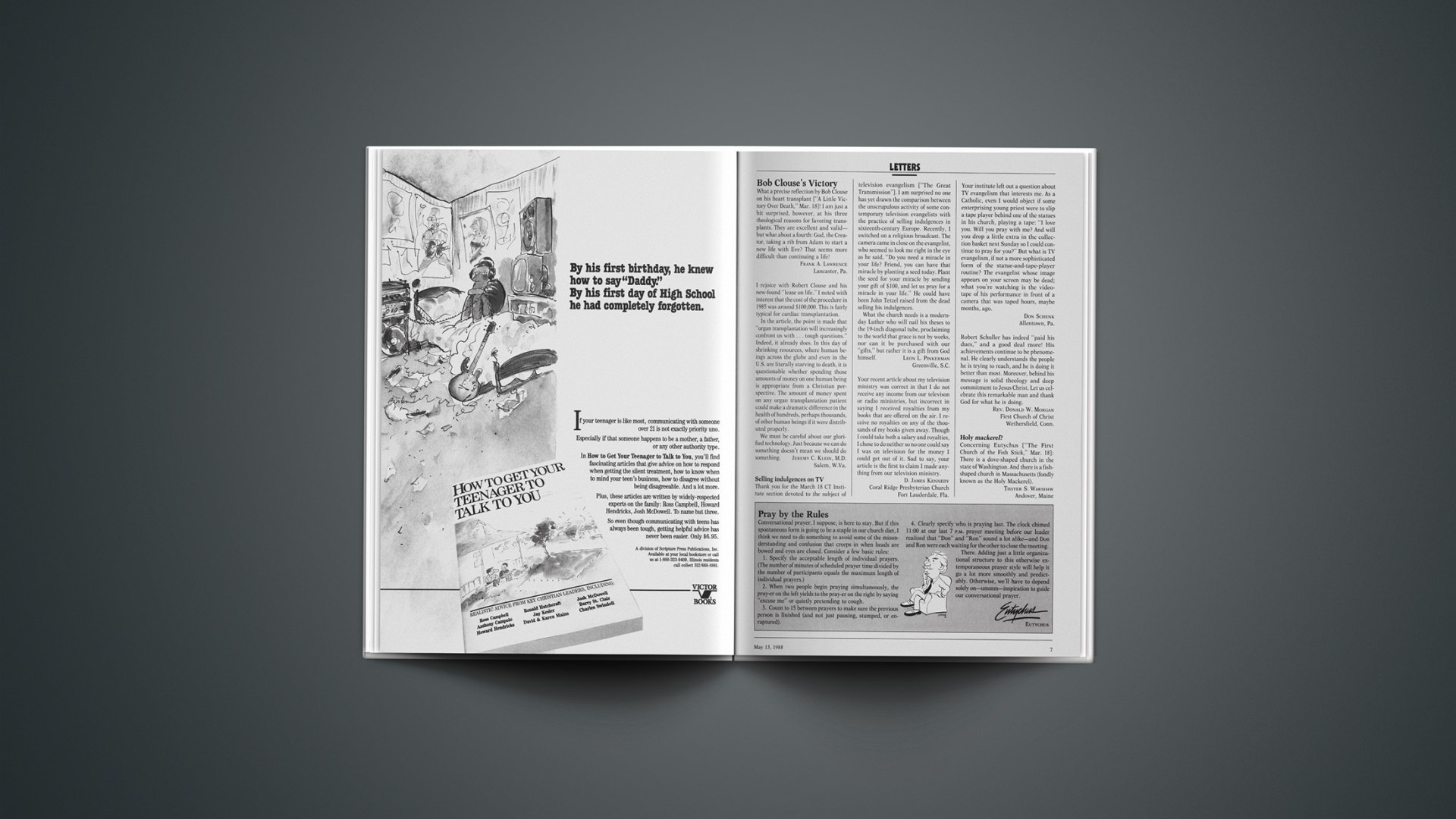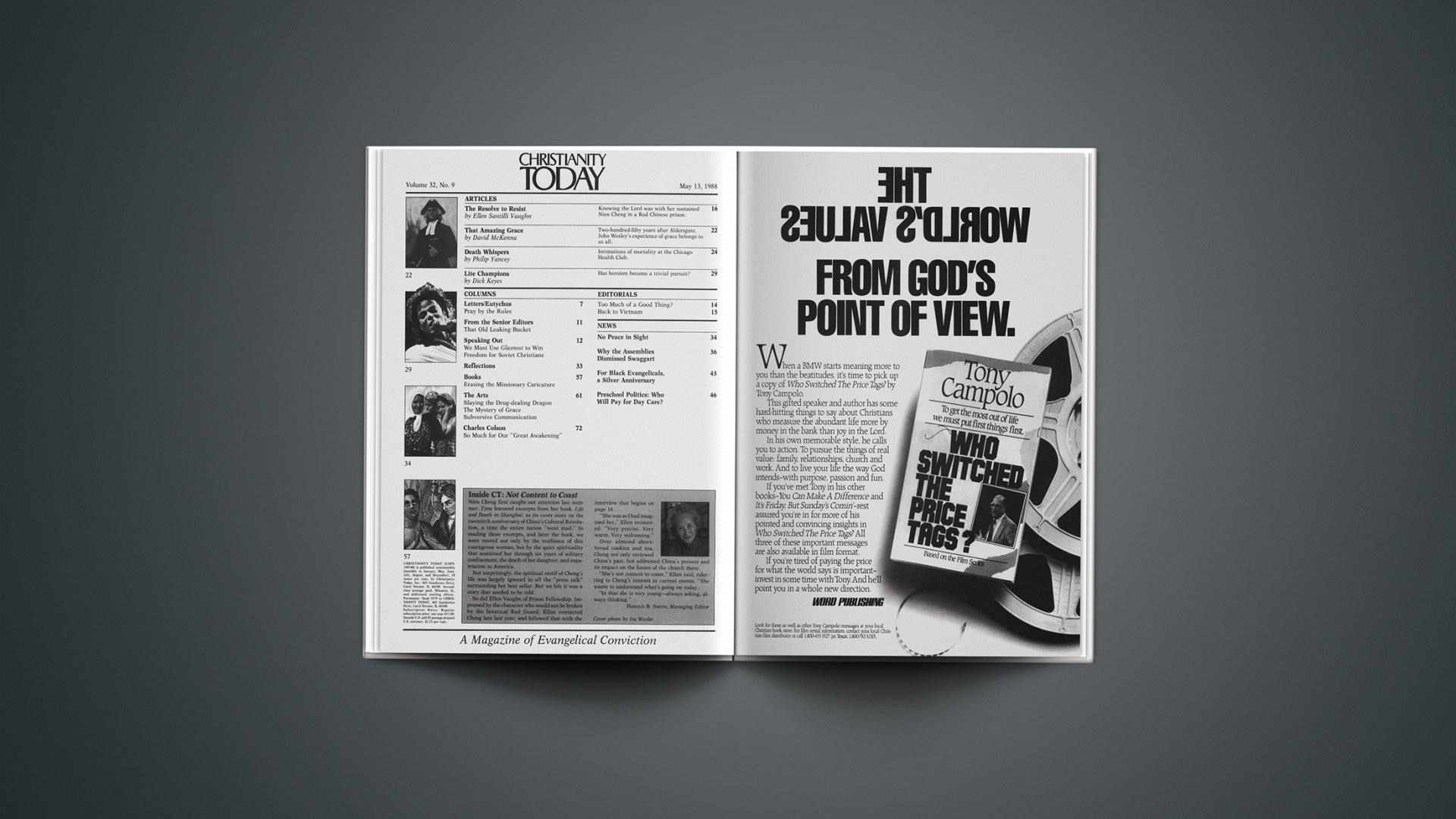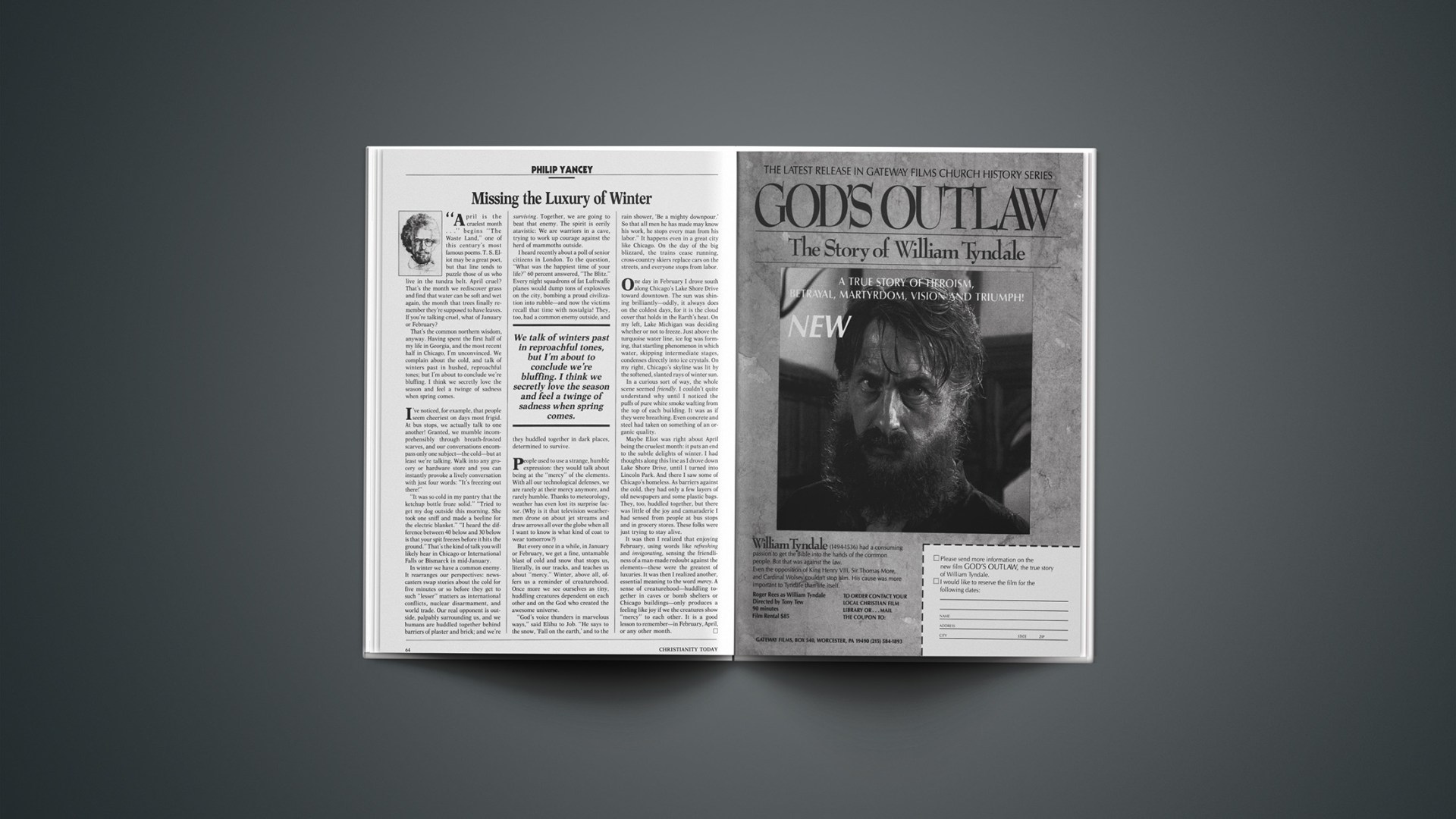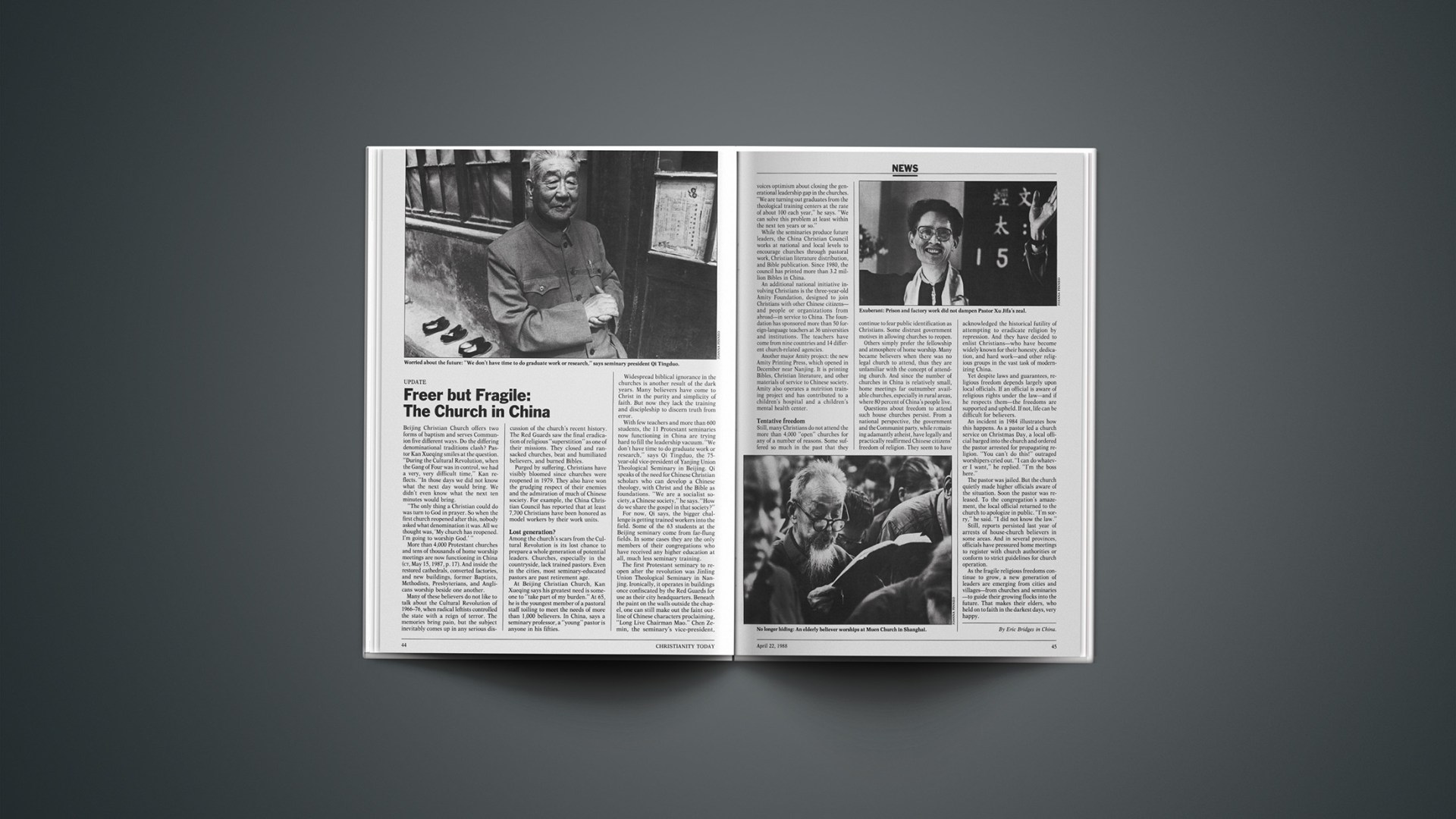Two-hundred-fifty years after Aldersgate, John Wesley’s experience of grace belongs to us all.
Two-hundred-fifty years ago, on May 24, 1738, a 35-year-old Oxford don, Anglican priest, and missionary to America went “very unwillingly” to a small room on a narrow street called Aldersgate in the north of London. At a quarter to nine, as someone read from Luther’s Preface to the Epistle to the Romans, he felt his heart “strangely warmed.” “I felt I did trust in Christ, Christ alone, for salvation,” he later wrote in his journal, “and an assurance was given to me that he had taken away my sins, even mine, and saved me from the law of sin and death.”
Immediately, with a band of jubilant friends, John Wesley left to find his brother Charles, who had come into a similar experience three days earlier. When they met, John spoke only two words: “I believe.” The whole company burst into “birth song”—the first hymn that Charles had written to celebrate his new-found faith in Christ:
Where shall my wandering soul begin?
How shall I all to heaven aspire?
A slave redeemed from death and sin,
A brand plucked from eternal fire.
How shall I equal triumphs raise,
Or sing my Great Deliverer’s praise?
After prayers of thanksgiving, the friends parted, without knowing that John Wesley’s heart-warming experience would be noted 250 years later as the watershed in his spiritual journey.
Aldersgate is more than an event in time; it is an experience in grace. By his own testimony, John Wesley never isolated the gift of grace from the ongoing work of the Holy Spirit—leading him to Aldersgate, assuring him of salvation, and hallowing him for a ministry that revived the soul and reformed the society of eighteenth-century England.
Wesley’s theology of grace lives on. Leading grace, assuring grace, and hallowing grace are timeless biblical truths. And by retracing Wesley’s journey in grace, we can see not only grace for reviving our own souls, but also grace for reforming our society.
Leading Grace
Grace led Wesley to Aldersgate. “Preserving grace,” as Wesley might call it, saved him from an arsonist’s fire at the manse of his father’s parish at Ep-worth, so that he later referred to himself as “a brand plucked from the burning.” “Preventing grace” kept him from gross sin as he learned the discipline of righteousness from his strong-minded mother and his exacting headmaster at Charterhouse School. “Quickening grace” created in Wesley a thirst for inward holiness that took him through the frustrations of intellectual search at Oxford and the futility of striving for salvation by the good works of the Holy Club.
Grace also attended his failures, leading him through ineffectiveness as an Anglican priest in England and a missionary in Georgia, to the “convicting grace” he met aboard ship as he fled America. There he watched Moravians whose lives witnessed to the inward peace he so desperately sought. And a Moravian named Peter Böhler helped him realize that his lifetime of reason, ritual, and righteousness stood for him as the last barrier to saving faith. Just before Aldersgate, grace made tender the heart of Wesley as he wept openly over his unbelief.
Modern psychology has caused us often to focus on the destructive aspects of our personal pasts, blaming traumas, tragedies, failures, and frustrations for our present problems. But examining our lives for evidence of leading or prevenient grace—the grace that goes before us and draws us to saving faith in Jesus Christ—can put our pasts to constructive use. Wesley and other early Methodists kept journals of their life history. They not only recorded their spiritual progress, but also remembered their spiritual past by tracing the evidence of prevenient grace at work in their lives.
Today, there is a renewed interest in logging the daily events of one’s spiritual journey. Reviewing the chapters of our lives and giving each chapter a name, we ask the question, “How was the Spirit of God leading me during this time in my life?” By tracing the movement of the Spirit, even through trauma, tragedy, frustration, and failure, we will sing of grace.
Prevenient grace also changes the way in which we look at others. Imagine the difference in our outlook if we viewed dissimilar people or cultures not through the eyes of superiority or prejudice, but with the question, “How is the Spirit of God leading this person or this culture toward Christ?” With the weight of glory on our shoulders, we would find ourselves with C. S. Lewis realizing that no person is common and no culture is hopeless.
Assuring Grace
Grace met Wesley at Aldersgate. Those of us who are accustomed to emotion in religion can hardly comprehend how radical it was for Wesley to confess, “I felt my heart strangely warmed.” His words ran counter to a lifetime of cold reason, rigid religion, and methodical good works. For the first time in his life, Wesley gave spiritual credibility to feeling as well as fact, heart as well as head, surprise as well as order.
Regenerating grace always brings the balance that makes us whole, a balance we all need. For Wesley, regeneration meant an emotional breakthrough to balance his disciplined mind and obedient will. In our day, grace may move us in the opposite direction. As Allan Bloom notes in The Closing of the American Mind, the discipline of reason and commitment to absolute values has been sacrificed to emotional intensity. Today we need discipline of intellect and obedience of will to balance the tendencies toward emotional intensity and experiential subjectivity.
Assuring grace confirmed Wesley’s justification at Aldersgate. On the return voyage from his aborted missionary venture in Georgia, Wesley met a Moravian pastor named August Gottlieb Spangenberg who asked him, “Does the Spirit of God witness with your spirit that you are a child of God?” Wesley could only answer, “I hope he died to save me.” At Aldersgate, however, he spoke with certainty, “I felt … an assurance was given me that he had taken away my sins, even mine, and saved me from the law of sin and death.”
This, too, is a need we all share. We still seek signs, seals, symbols, and symptoms as proof of spiritual certainty. None is more scriptural nor more exacting than the continuing question of the Moravian pastor. If our leaders and people regularly had asked and answered each other, “Does his Spirit witness with your spirit that you are a child of God?” some of the scandals and disillusionment that have blotted our recent evangelical history might well have been avoided.
Hallowing Grace
Grace followed Wesley from Aldersgate. While we best remember Wesley’s affirmation of faith at Aldersgate, we cannot neglect the rest of his testimony. Immediately after he experienced the strange warming of his heart, he began to pray for those who despitefully used and abused him. But soon, Wesley wrote, “The enemy suggested, ‘This cannot be faith; for where is thy joy?’ ” The lifelong struggle for inward holiness was not over.
At one time after Aldersgate, Wesley wrote out of depressed agony, “I am not a Christian.” At another time he foolishly flipped open his Bible to justify marrying a woman ill-suited to his style of ministry. Yet, his pursuit of inward holiness did not cease. Throughout his ministry he preached the message of hallowing grace—the gift of the Holy Spirit that fills the heart with love.
Wesley frequently asked believers, “Have you received the filling of the Holy Spirit?” He preferred to speak of the “filling of the Spirit” rather than the “baptism of the Spirit.” To illustrate “the filling,” he used the analogy of a house. Our repentance, he said, is the porch, justification is the doorway, and sanctification is the Holy Spirit filling every room of the house.
The quest for holiness is being renewed among us. After a swing of the pendulum to a period of religious activism, we sense the need for spiritual cleansing and filling. Hallowing grace awaits us. With the incarnate spirit of “Christ in us” as our promise, we sing the Wesley hymn:
Finish then thy new creation,
Pure and spotless let us be,
Let us see thy great salvation
Perfectly restored in thee.
The quest for holiness, however, is not without its own check and balance. For John Wesley, piety and mercy were inseparably linked in the experience of hallowing grace. He likened the witness of the Spirit to a two-sided coin: On one side is the witness that we are the children of God—the inward evidence of piety. On the other side is the witness that we are obedient to his will—the outward evidence of justice and mercy.
For Wesley, hallowing grace meant giving grace. Under the banner of “faith working through love,” he traveled more than 250,000 miles on horseback, preached a thousand times a year, wrote 400 books, established hundreds of societies, and founded schools, hospitals, and orphanages.
By giving himself, Wesley found the joy he sought. For him, perfect love expressed through the world of action became another way to “celebrate the sovereignty of grace.”
Aldersgate belongs to all of us. It is not the time, the place, or the person that we celebrate 250 years after the event. It is the grace that leads us to Christ, assures us of salvation, and hallows us for deeds of justice and mercy. Aldersgate still calls us to the saving grace that strangely warms the heart and sets the soul to singing.
David McKenna is president of Asbury Theological Seminary and author of The Whisper of His Grace (Word).

